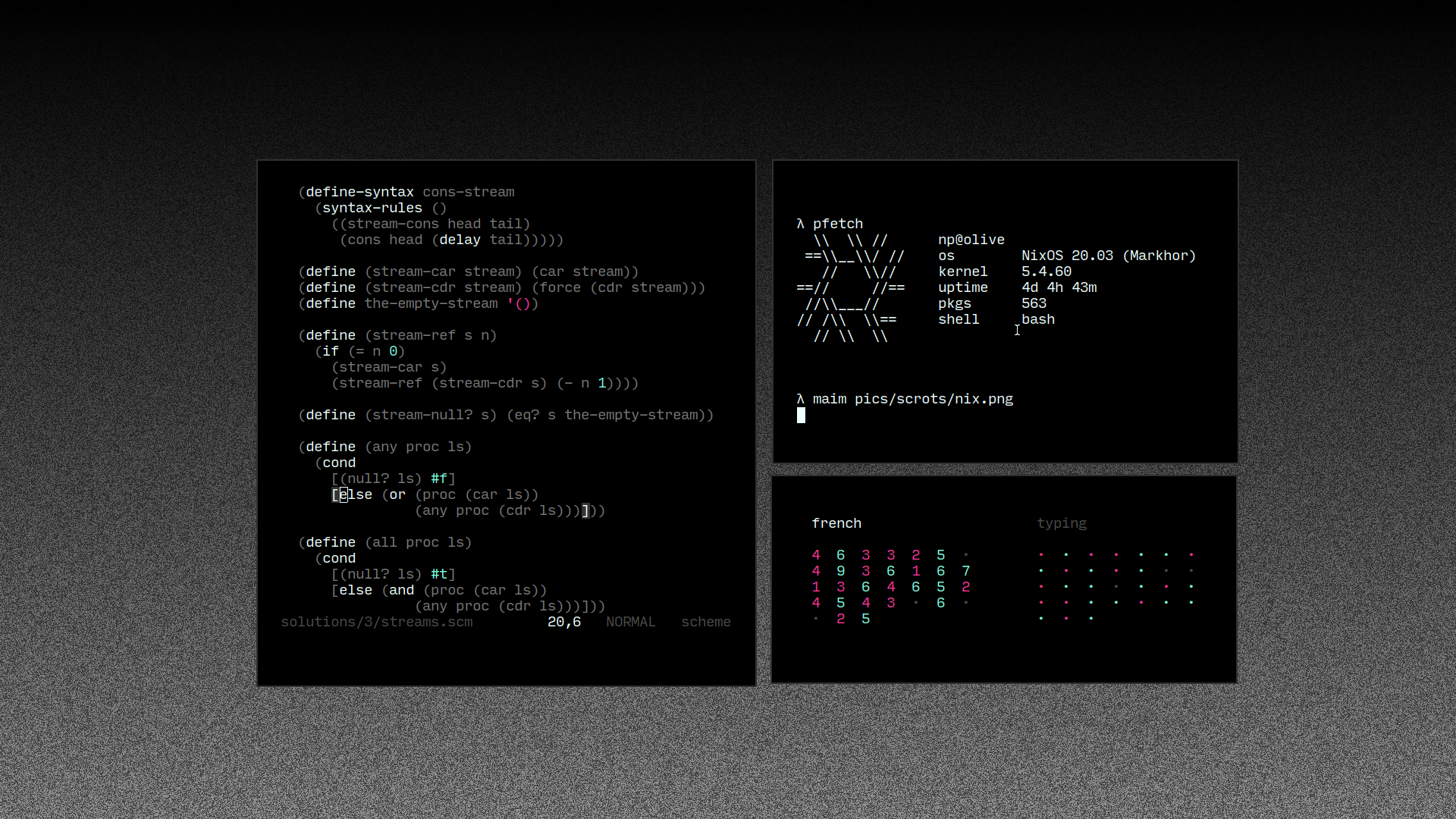1
2
3
4
5
6
7
8
9
10
11
12
13
14
15
16
17
18
19
20
21
22
23
24
25
26
27
28
29
30
31
32
33
34
35
36
37
38
39
40
41
42
43
44
45
46
47
48
49
50
51
52
53
54
55
56
57
58
59
60
61
62
63
64
65
66
67
68
69
70
71
72
73
74
75
76
77
78
79
80
81
82
83
84
85
86
87
88
89
90
91
92
93
94
|
I have been eyeing operating systems with functional package
managers for a while now, aka, NixOS or Guix. Reproducible
builds, declarative and rollback-able system configuration,
system consistency, all sound pretty cool. I have been using
NixOS for about a month now.
### Installation
I went with their minimal installation ISO. The installation
was pretty smooth from start to end, no hitches there. The
entire [manual](https://nixos.org/manual/nixos/stable/) is
available offline, and is accessible during the
installation. Very handy.
### Setup
The entire system is configured via
`/etc/nixos/configuration.nix`. Wifi, `libinput` gestures,
audio, locale settings, there are options for literally
everything. You can declaratively write down the packages
you want installed too. With fresh installs of most distros,
I usually fumble with getting things like screen backlight
and media keys to work. If I do manage to fix it, I can't
carry it forward to future installations trivially. Getting
all my hardware to work on NixOS is as easy as:
```
{
server.xserver.libinput.enable = true; # touchpad
programs.light.enable = true; # backlight
hardware.pulseaudio.enable = true; # audio
networking.wireless.enable = true; # wifi
}
```
### Developing with Nix
Nix makes it easy to enter environments that aren't affected
by your system configuration using `nix-shell`.
Builds may be generated by specifying a `default.nix` file,
and running `nix-build`. Conventional package managers
require you to specify a dependency list, but there is no
guarantee that this list is complete. The package will build
on your machine even if you forget a dependency. However,
with Nix, packages are installed to `/nix/store`, and not
global paths such as `/usr/bin/...`, if your project builds,
it means you have included every last one.
Issues on most my projects have been "unable to build
because `libxcb` is missing", or "this version of `openssl`
is too old". Tools like `cargo` and `pip` are poor package
managers. While they *can* guarantee that Rust or Python
dependencies are met, they make assumptions about the
target system.
For example, [this
website](https://github.com/nerdypepper/site) is now built
using Nix, anyone using Nix may simply, clone the repository
and run `./generate.sh`, and it would *just work*, while
keeping your global namespace clean™:
```bash
#! /usr/bin/env nix-shell
#! nix-shell -i bash -p eva pandoc esh
# some bash magic ;)
```
Dependencies are included with the `-p` flag, the shell
script is executed with an interpreter, specified with the
`-i` flag.
### Impressions
NixOS is by no means, simple. As a newcomer, using Nix was
not easy, heck, I had to learn a purely functional, lazy
language to just build programs. There is a lot to be
desired on the tooling front as well. A well fleshed out LSP
plugin would be nice ([rnix-lsp looks
promising](https://github.com/nix-community/rnix-lsp)).
Being able to rollback changes at a system level is cool.
Package broke something? Just `nixos-rebuild switch
--rollback`! Deleted `nix` by mistake? Find the binary in
`/nix/store` and rollback! You aren't punished for not
thinking twice.
I don't see myself switching to anything else in the near
future, NixOS does a lot of things right. If I ever need to
reinstall NixOS, I can generate an [image of my current
system](https://github.com/nix-community/nixos-generators).
[](https://u.peppe.rs/6m.png)
|
